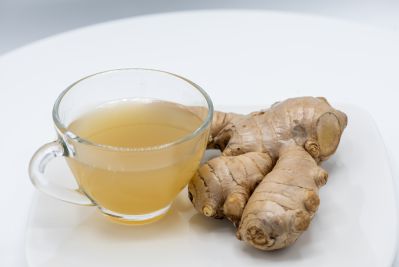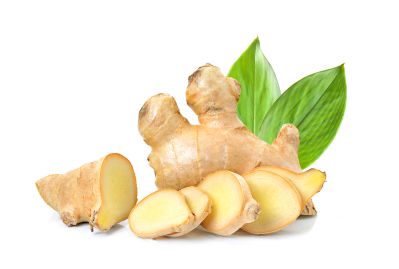Ginger
Description : Ginger is commonly used as spice and well known for its anti-mutagenic effect.
Article Details :
Ginger is basically the root of Zingiber officinale Roscoe plant. It is commonly used as spice, but it has also been used in the field of folk medicines for centuries, where it had used to treat several diseases, inflammation, infections and facilitates healing. It is also well known for its anti-mutagenic effect. The nutritional composition of ginger makes it one of the most important food stuffs worldwide.
Nutritional profile of ginger
- Ginger contains very low amount of carbohydrates, fibre, proteins and fats both saturated and unsaturated fatty acid within it
- It has high moisture content
- It contains some important trace element like sodium, potassium, magnesium and too some extent of calcium and iron
- It also contains Vitamin C and Vitamin B6
- It contains some chemical constituents which are known as gingerol, shogaol, citral, zingiber and zingerone. Among which gingerol and shogaol are the most effective component of ginger responsible for enhancing its health significance and plays several important roles in body
- It also contains some protease enzymes that promotes digestion
Health benefits
Role on relieving nausea
- It has a role in preventing nausea. The gingerol and shogaol component of ginger are the most active biological compound responsible for enhancing stomach emptying which is related with reducing nausea
- It helps to stimulate the release of blood pressure regulating hormone within body hence help to calm the body and decreases nausea
- It is beneficial to use ginger to prevent morning sickness in pregnancy, mountain sickness, sea sickness and helps to prevent nausea after surgery
Role on preventing cold or flu
- It has been traditionally used for preventing the consequences of colds and flu as it helps to reduce the susceptibility of infection
- It also helps to protect the respiratory system and plays significant role in preventing the growth, multiplication and replication of those viruses which are responsible for respiratory infections

Role on regulating blood sugar
- The shogaol and gingerol contents of ginger are responsible for enhancing the sensitivity of insulin and helps to reduce blood sugar level and related consequences of diabetes
- It mainly helps to reduce fasting blood sugar level. It has estimated that consumption of 2g of ginger powder may reduce the fasting blood sugar level and it is also related with reducing the risk of developing type 2 diabetes
- It also improves the symptoms of glycosylated haemoglobin and helps to reduce the concentration of blood sugar significantly (about 10%) within a specific period of time (about 10 to 12 weeks)
Role on cardiovascular disease
- Ginger is associated with reducing the concentration of LDL, VLDL and triglyceride within body which are considered as the principle factor of developing atherosclerosis and ischemic heart disease
- It also helps to increase the HDL level in body. HDL helps to remove LDL from blood and hence reduces the blood LDL concentration that decreases the risk of developing atherosclerosis
- It has seen that ginger is related with decreasing Apo B to Apo A-1 ratio. This ratio indicates the balance between the concentration of bad cholesterol and good cholesterol. Having a higher ratio indicates higher risk of cardiovascular diseases. As ginger helps to lower this respective ratio hence it may be used as a potential cardio protective food substance
Role on digestion
- The enzyme present in ginger is responsible for enhancing the digestive responsiveness of body and helps in easy digestion of food
- It helps to increase the catalytic activity of trypsin (protein splitting enzyme) and pancreatic lipase (fat splitting enzyme) within body
- It also helps to reduce the risk of gas production within gastrointestinal tract during digestion hence helps to reduce flatulence and gastrointestinal discomfort
- It is also related with increasing peristalsis and promotes bowel health with reducing the risk of constipation
Role on nervous system
- Gingerol of ginger is responsible for preventing any kind of oxidative stress and inflammation occurred in brain
- It is also associated with increasing the functionality of brain and helps to reduce age related decline in cognitive abilities and brain functions
- It has seen that individual who consumes ginger every day has comparatively better memory than those who does not consume ginger
- It also helps to prevent the consequences of Alzheimer’s disease
Role on obesity
- Ginger is associated with boosting up metabolism. It is beneficial to consume ginger water in empty stomach as it increases the catabolic rate and helps to reduce body weight
- As mentioned above it helps to regulate the LDL and HDL ratio of body that is an important feature of reducing fat deposition Read more




